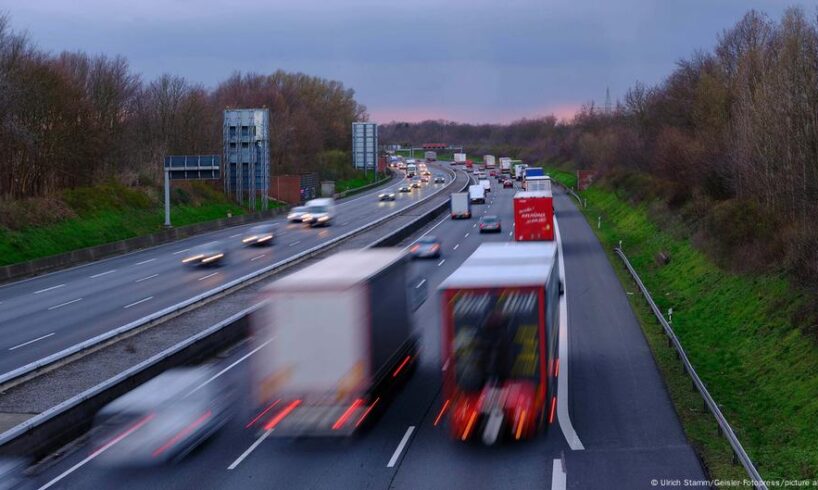
The 2026 budget is currently being debated in the lower house of parliament, the Bundestag. The draft was presented by Finance Minister and Vice Chancellor Lars Klingbeil and will be deliberated for around two months before being voted on at the end of November.
The discussions will not be easy. Many ministries will have to work with significantly smaller budgets, because tax revenues are far from sufficient to cover government spending.
To kick off the budget talks, Klingbeil spoke of tough times ahead. The government, made up of the center-right bloc of Christian Democratic Union (CDU) and Christian Social Union (CSU) and the center-left Social Democratic Party (SPD), will have to make “courageous and sometimes uncomfortable decisions,” he said. “It will be exhausting, it will be challenging.”
The federal transport ministry had not really worried about being hit by budget cuts. After all, the renovation of the crumbling infrastructure is a top priority, and the government just recently launched a €500 billion ($587 billion) credit-financed special fund for infrastructure and climate protection. “In many areas, our country has been ruined by austerity. We want the excavators to get to work quickly,” has been the credo of Finance Minister Klingbeil.
Finance Minister Lars Klingbeil has presented his draft budget for 2026Image: Kira Hofmann/BMF/photothek.de/picture alliance
Transport Minister Patrick Schnieder expected his ministry to benefit enormously from this special fund. Clearly, transport routes such as roads, railways and bridges are all part of the federal infrastructure, and they are in poor condition.
Ailing transport infrastructure
The transport ministry has identified around 25,000 kilometers (15,500 miles) of highways that are in need of repair — that’s almost a quarter of the entire network. The situation is particularly dire for highway bridges: around 5,000 bridges are considered to be in urgent need of repair, or must be rebuilt.
In fact, the rail network of state-owned Deutsche Bahn is so run-down that only every other train arrives at its destination on time.
In the current fiscal year, Klingbeil has allocated just under €12 billion from the special fund to the transport ministry. In 2026, this figure is set to rise to more than €21 billion. However, what Transport Minister Schnieder certainly did not expect was that Klingbeil would cut his basic budget by €10 billion.
Klingbeil denies that he is using the billions saved to plug holes in the budget. But sharp criticism has come from the opposition. They have pointed out that the government had promised that the loans from the special fund would be used exclusively to finance new investments.
The transport minister has also expressed his frustration. Not only because he will now receive less funding, but also because he will face additional restrictions. Now, no new construction or expansion projects may be financed from the special fund, with the exception of highway bridges that cannot be renovated.
Germany’s billions in funds not enough to fix infrastructure
To view this video please enable JavaScript, and consider upgrading to a web browser that supports HTML5 video
However, according to Schnieder, his reduced budget is no longer sufficient. “We are short by around €15 billion for the period from 2026 to 2029,” Schnieder estimated in an interview with the German daily FAZ newspaper. He added that this would mean stopping and postponing 74 new motorway construction and expansion projects, as well as 99 federal highway projects that had already been planned. This primarily affects projects to complete missing sections of motorways or bypasses.
The transport minister is putting pressure on the Bundestag
The Bundestag’s budget committee has requested a list from the transport ministry of all the routes affected. Schnieder has submitted the list and also added the electoral districts in which they are located. This allows every member of the Bundestag to see at a glance what the shortfall in financial planning means for them, their constituents, and local citizens.
Transport Minister Patrick Schnieder (r) says almost a quarter of Germany’s motorways are in urgent need of repair Image: dts Nachrichtenagentur/IMAGO
In a harshly worded letter to Schnieder, the finance minister then pointed out that Schnieder had previously accepted the agreed-upon financial framework, and that no other sector was receiving more investment than the transport sector. A total of €166 billion is earmarked for transport investments by 2029. He said that it is now up to Schnieder to prioritize and use his funds effectively.
However, there is great outrage in the places affected by the construction freeze. The states are insisting that the federal government continue to finance planned projects to build and expand infrastructure.
At a parliamentary group meeting, Chancellor Friedrich Merz promised that everything would be done to enable the largest possible number of new construction projects.
The magic word for this is flexibility.The initial focus will be on renovation and maintenance. “In the coming budgets, we must then also turn our attention to more new road and rail construction,” said Schnieder at the start of the budget deliberations in the Bundestag.
The SPD parliamentary group is sending mixed signals on this issue. The group’s parliamentary secretary, Dirk Wiese, said that the principle of “maintenance before new construction” does not, of course, mean that all projects currently in the planning stage will be scrapped. However, he added that it is also the responsibility of the transport ministry to set priorities.
Encouraging private investment
It is safe to assume that the debate about new highways and expressways will not be the only controversy in the budget discussions — especially since the Bundesrechnungshof, Germany’s top auditing institution which monitors how the state handles its money, is demanding greater austerity measures from the government. Its report on the 2026 budget states that almost every third euro is financed through credit. This, the auditors warn, is not sound financial management and could lead to a debt spiral.
Meanwhile, Chancellor Merz has put forward an idea. “Public investment alone cannot achieve what is needed in Germany and cannot make up for what we have neglected in recent years in terms of investment in our infrastructure.” Private investors are greatly interested in investing in German infrastructure. “So, there could also be joint projects between the public sector and private investors. We plan to set up larger PPP projects with the Ministry of Transport.”
This article was originally written in German.
While you’re here: Every Tuesday, DW editors round up what is happening in German politics and society. You can sign up here for the weekly email newsletter, Berlin Briefing.





